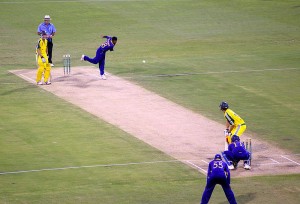Justice is ill-served, even in sports, in a worldview built on reincarnation.
That’s the gist of a recent article picked up by Yahoo News from Pradeep Magazine in the Hindustan Times. The writer, in a piece entitled Crime and punishment an alien concept, bemoans the lack of accountability for cheating in India’s favorite sport of cricket.
In Hinduism the concept of justice in this life does not exist. The doctrine of reincarnation means one can live this life without fear of justice; punishment is pushed into the next life.
In a society which believes in a world where change is never linear but cyclical, a revolution is an impossibility. The more things change, the more they remain the same is a perfect catchword for people in whose worldview personal salvation overrides collective good.
Infinite would be the examples in our country to prove that this extremely selfish philosophy, ingrained in us through our belief that this world is governed by karmic laws, is anti-progress. It may help an individual gain nirvana, but does not help a societal change for the good of everyone.
This will be the case for any culture with a cyclical worldview. Justice is postponed! You may sin in this life, but there is no punishment until the next. (Go here to read the writer’s take on the illustration of justice and cricket.)
We often assume that all people see the world in the same way. We’re all human, after all. But this notion of common perception is mistaken. It is the Judeo-Christian worldview that provides the framework for people and nations to develop wholistically: personally, socially, economically and politically.
Historian Thomas Cahill, in his remarkable book The Gift of the Jews, helps us to understand the world the Jews have given us.
The Jews gave us a whole new vocabulary, a whole new Temple of the Spirit, an inner landscape of ideas and feelings that had never been known before. Because of their unique belief – monotheism – the Jews were able to give us the Great Whole, a unified universe that makes sense and that, because of its evident superiority as a worldview, completely overwhelms the warring and contradictory phenomena of polytheism. They gave us the Conscience of the West ….
The Jews gave us the Outside and the Inside – our outlook and our inner life. We can hardly get up in the morning or cross the street without being Jewish. We dream Jewish dreams and hope Jewish hopes. Most of our best words, in fact – new, adventure, surprise; unique, individual, person, vocation; time, history, future; freedom, progress, spirit; faith, hope, justice [emphasis mine]– are the gifts of the Jews.
Just nations do not fall from the sky. Nor are they simply prayed into existence (though prayer for justice is an important part of the process). Just nations are built. They require a foundation. And that foundation is the metaphysical capital of the Judeo-Christian worldview. It is the gift of the Jews that makes justice possible.
A foundation for justice in a society requires three key components, three truths that must be acknowledged.
First, the universe is moral. There is absolute right and wrong. God’s character establishes the moral standard of the universe. This stands in contrast to the Hindu concept that all is one. Such a concept requires the fusion of good and evil. The Biblical metaphysic gives a standard for justice: God is just! He wants justice—and not corruption—to reign over the affairs of men.
Second, history is going somewhere. The Judeo-Christian metaphysic acknowledges a lineal concept of time, past-present-future. Contrast this with Hinduism’s cyclical view of time. The Biblical framework provides for cause and effect within history. Justice can be served within time.
Third, human beings are free moral agents. They make decisions that impact history and are held accountable for their actions for good or ill. Being free means a corresponding obligation of moral responsibility. In Hinduism, a human being has no reality or substance. Human beings, like everything else, are an illusion – maya. The Judeo-Christian mindset affirms that our lives count for something; the Hindu concept reduces the individual to an illusion. In Hinduism, “when a person enters the water and they make no ripples.”
Atheism, Animism, Hinduism, Buddhism — none of these provide the Outside and the Inside – our outlook and our inner life – that allows for the building of just societies. Justice in India will not grow in a Hindu soil.
– Darrow Miller







2 Comments
Daniel Murray
October 3, 2013 - 11:26 pmAs the universe as God created it, is moral, how do you balance it in practice to avoid legalism?
Darrow
October 4, 2013 - 7:56 amHi Daniel
Thanks for your inquiry. The opposite of a moral universe is an amoral universe. The opposite of legalism is lawlessness. True freedom, the balance, is voluntary self- government within the framework of God’s moral law.
Darrow